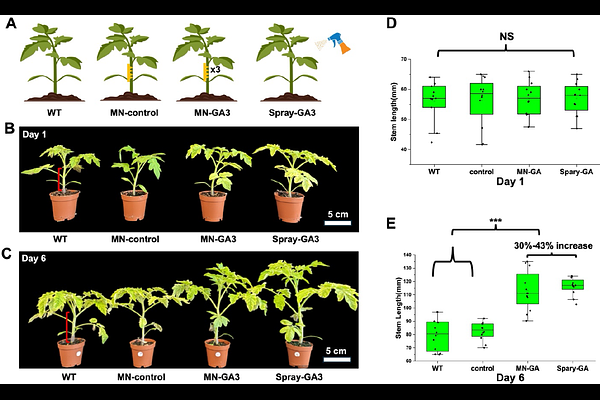Microneedle-based precision payload delivery in plants

Microneedle-based precision payload delivery in plants
Li, M.; Poonam, A. D.; Singh, D.; Whitfield, A. E.; Wei, Q.
AbstractTraditional crop delivery methods, such as foliar spray and soil application, face significant limitations including nutrient loss, environmental impacts, and low delivery efficiency. Recent advances in nanomaterials have offered novel molecular delivery platforms, but challenges such as toxicity, complexity, and labor-intensive processes persist. To address these issues, we developed a polyvinyl alcohol (PVA)-based microneedle (MN) delivery system that can be precisely applied to various plant tissues (e.g., leaves or stems), which demonstrates high delivery efficiency compared to the conventional methods while reducing application dose by 90-99%. This MN system facilitates delivery of diverse small molecules ranging from fluorescent dyes, growth promoters, to antiviral agents into plant tissues. By applying fluorescent dye-loaded MNs onto tomato stems, we demonstrated effective molecular diffusion through vascular tissues. Additionally, MNs loaded with gibberellic acid (GA3) enhanced stem and branch growth in tomatoes and restored the lateral flowering phenotype in Arabidopsis ft-10 mutants, with significant upregulation of GA receptor gene expression. Lastly, salicylic acid (SA) injections with MNs induced resistance to Tomato Spotted Wilt Virus (TSWV) in Nicotiana Benthamiana, comparable to conventional spray-based approaches. This easily fabricated and cost-effective PVA-MN system provides a promising tool for precision agriculture, enhancing plant health and productivity while addressing the limitations of conventional delivery methods.